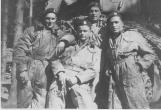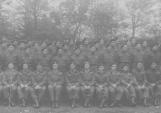79
The 8th Army objective had been Venice but it was stopped because the troops were needed in northern Europe. In February 1945, the 1st Canadian Corps, including the BCDs, were withdrawn from Italy and sent to join the 1st Canadian Army fighting under the command of Field Marshal Montgomery in Northwest Europe. They crossed back to the west coast of Italy to sail to Marseilles, France, and then by train to the town of Roulers, in Belgium. There they were re-equipped prior to moving into the Netherlands to join the final push against the Germans.In April 1945 the Regiment was once again in action, this time as part of the armoured force that drove from Arnhem to the Ijsselmeer, cutting the German forces in Holland in two. The Dragoons found themselves fighting old men and boys as well as battle-hardened veterans of the German Army. Immediately thereafter the Regiment shifted to the eastern Netherlands to help clear the Delfzijl pocket of enemy in late April 1945. This was the last battle fought by the Regiment in WW II. It saw troops from the Dragoons liberate the towns of Appingdam and Marsum and shoot from atop the dikes at the fleeing German troops escaping by water to Emden, Germany.
VE-Day, 5 May 1945, found the Dragoons billeted in Groningen, Holland amid wild celebrations. "Thank God so many of us still live," wrote Lt. Col. Angle. "Celebrations in Groningen consisted of much shouting and shooting of SA (small arms) and flares," he continued. "Most of the shooting is done by civilians. The troops received the news in their usual matter-of-fact manner and carried on with their jobs." The Burgomaster of Loppersum was not so matter-of-fact. On 15 May 1945 he wrote to Lt. Col. Angle in this way:
"My Dear Commander, The Netherlands are Free. This is a wonder which we can scarcely conceive. To be free from oppression, and tyranny, from danger and terror. Next to God, we owe your brave officers and soldiers thanks beyond words. Loppersum pays tribute to you in this moment. We will never forget your glorious achievements. Long live Canada. Long live its brave army."
During the fighting the unit suffered 289 casualties, 4 officers and 78 other ranks killed, 27 officers and 180 other ranks wounded. One officer and one soldier were captured; the officer escaped. The Regiment was awarded the following battle honours: Liri Valley, Melfa Crossing, Gothic Line, Pozzo Alto Ridge, Lamone Crossing, Conventello - Commachio, Italy 1944-1945, Ijsselmeer, Delfzijl Pocket, and Northwest Europe 1945. Members of the Regiment received 20 decorations by wars end.
Following VE-Day the Regiment spent seven months in Holland before returning home. There was much recreation, sports, and leave to Amsterdam, Rotterdam and Utrecht. The unit's tanks were spruced up with new paint for an inspection and mounted march-pas of the 5th CAD on 25 May before Lt. Gen. H. Crerar, at the Eede airport near Groningen. At the end of May the Regiment moved to the town of Veendam to assist in guarding and moving German prisoners of war, marching their way back home. Of this Lt. Col. Angle remarked, "The Germans marched past (sic) by the thousands. Their MT (motor transport) and horse-drawn transport is falling apart and will not last farther than then the German border, methinks. . . There were no incidents. Their troops and ours adopted a 'stony' reserve towards each other - which is as it should be."
By July 1945 the Regiment had turned over all its tanks, "those fearsome and faithful chariots," in the words of Angle, to the Ordnance Corps. Gradually, throughout that summer, men left the Regiment to volunteer for occupation duties in Germany, for Far Eastern service against Japan, or repatriation back to Canada.












